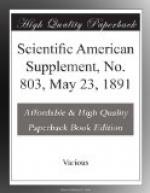After a number of experiments, Mr. Popp arrived at the conclusion that the simplest mode of heating, if not the most efficient, was at all events the most suitable, as it was a matter of the first importance that subscribers should not be troubled with the charge of any apparatus involving complication or careful management; he therefore adopted a simple form of cast iron stove lined with fireclay, heated either by a gas jet or by a small coke fire. It was found that this apparatus, crude as it was, answered the desired purpose, until some better arrangement was perfected, and the type was accordingly adopted throughout the whole system. It was quite recognized that this method still left much to be desired, and the economy resulting from the use of an improved form was very marked.
From a large number of trials very carefully carried out by Professor Gutermuth, it was found that more than 70 per cent. of the total number of calories in the fuel employed was absorbed by the air and transformed into useful work. Whether gas or coal be employed as the fuel, the amount required is so small as to be scarcely worth consideration; according to the experiments carried out, it does not exceed 0.09 kilo. per horse power and per hour, but it is scarcely to be expected that in regular practice this quantity is not largely exceeded. Professor Weyrauch has also carefully investigated this part of the subject and fully confirms, if he, indeed, does not go beyond Professor Gutermuth. He claims that the efficiency of fuel consumed in this way is six times greater than when burnt under a boiler to generate steam. He goes so far as to assert that with a good method of heating the air, not only can all the losses due to the production and the transmission of the compressed air be made good, but also that it will actually contain more useful energy at the motor than was expended at the central station in compressing it.
According to Professor Riedler, from 15 to 20 per cent. above the power at the central station can be obtained by means at the disposal of the power users, and it has been shown by experiment that by heating the air to 250 deg. Cent. an increased efficiency of 30 per cent. can be obtained. Better results than those heretofore obtained may, therefore, be confidently expected with a more perfect and economical application of the fuel in heating the air, and a better means of regulation in admitting it to the motors. In his report Professor Riedler indicates a method by the use of which he considers considerable advantages may be secured. This is the heating the air in two stages instead of at one operation, and passing it through two motors, to the first of which the air is admitted heated only to a moderate extent; the exhaust from this motor then passes into a second heater and thence into the second motor. A series of experiments with this arrangement were recently carried out.




